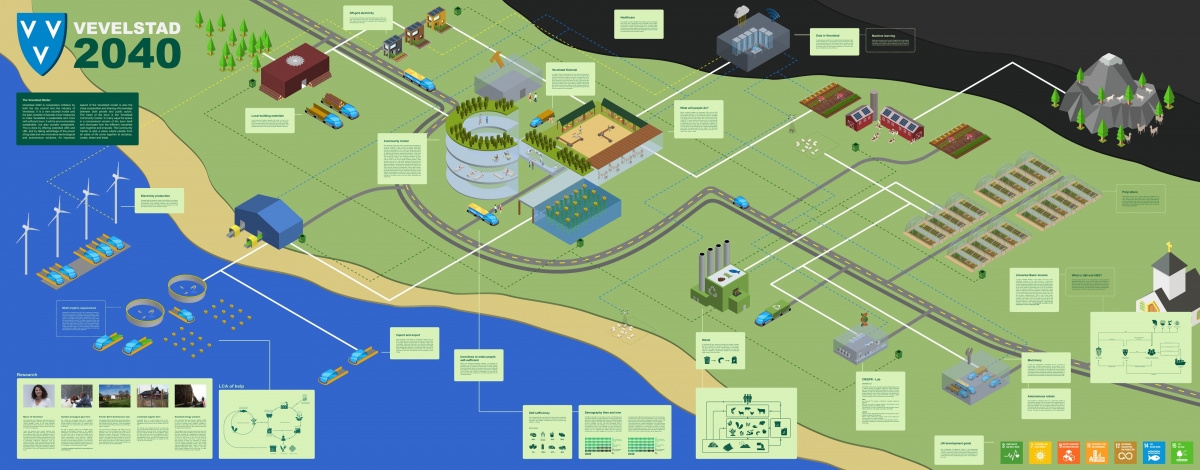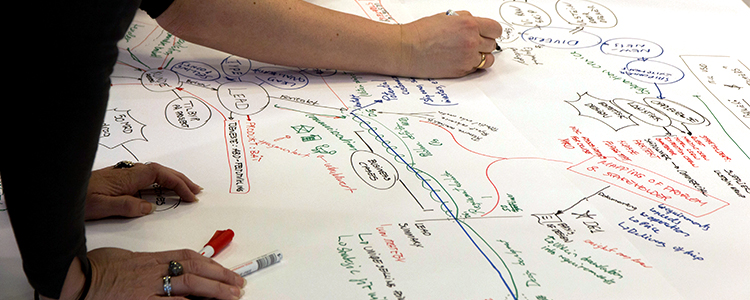By pursuing a Master’s degree in Systems Oriented Design (SOD), you will enhance your knowledge about the discipline, learn about the newest research in the field and become part of a unique, interdisciplinary academic community. This experience-based master’s degree is part of AHO’s further education programme and provides insight into solving complex problems by combining systemic thinking with design thinking in an innovative form of design.

Photo: Lea Brochard and Nicoletta Aveni, AHO 2012
Who can apply?
A Master's degree in Systems Oriented Design (SOD) is relevant for a range of people in different positions who are working with complex problem-solving and in interdisciplinary collaborations. SOD is an approach to complexity that is influenced by and adapted to the designer’s way of thinking. Moreover, it can easily be utilised by people who are not designers, because the method is flexible and adapts to individual needs and situations.
Relevant applicants to this master’s degree may therefore be designers, engineers, middle managers, project managers and specialists with responsibilities for organisational development and a holistic approach to problem-solving. We invite applicants who encompass a wide range of roles and positions in the private and public sectors, as well as within non-governmental organisations. The programme is also relevant to those who already have a master’s degree but wish to renew and expand their knowledge.
The master’s programme is taught in English, which means that the students are required to have sufficient English oral and writing skills.
What are you going to learn?
Systems Oriented Design (SOD) combines design thinking with systems thinking and is a method to visualise intricate issues and systems, such as within a firm or an organisation. This methodology helps us to create a holistic overview of complex or wicked problems and coordinate valuable insight from different stakeholders, including both experts and users. This knowledge forms the basis for the creation of innovative ideas and great designs for new products and services that fit into a larger context.
In acquiring this methodical knowledge, you will practice solving multifaceted problems and learn to see connections between different problems and systems. Moreover, you will learn to analyse different systems, how they can be influenced and the tools and solutions to do so. You will also learn how to predict and avoid unexpected and unwanted consequences of potential measures and suggested interventions. This is particularly important from a sustainable perspective and will make you better equipped to actively participate in academic and public debates by integrating a holistic perspective in far-reaching and complex contexts.
The master’s programme will increase your formal qualifications, strengthen your academic knowledge and provide insight into and skills related to research and development work that utilises SOD.

Photo:Kristin Marie Brudeseth, Malin Emilie Hoff, Kristoffer Steen Langvik, Andreas Grøndahl Offenberg, June Steinovden, AHO (2020)
How do you learn?
The programme is seminar-based and it is crucial that the students are well prepared for the sessions in advance. Through lectures, discussions and assignments in the seminars, you will learn to visualise complex issues and express your thoughts about them orally and in writing. You will thus acquire analytic and theoretical skills and develop the ability to discuss, offer academic criticism and write concisely.
During the programme, you will work on an individual project related to your own employment or interests, which will be relevant to several of the programme’s modules.
You will also have a great deal of freedom when it comes to choosing the topic of your master’s thesis and the opportunity to relate it to your own work and field of interest. The thesis can be theoretical, in the form of a project or a combination of both.

Photo: Palak Dudani.
An academic forum
Once admitted, you will become part of an academic community that includes representatives from the private and public sectors and from research environments. Your fellow students will bring different skills and knowledge to the table, and you will take part in interesting and informative academic exchanges. The student group will form a professional network that will persist even after graduation.
You will also be invited to the International Systemic Design Association's events and discussions.
Funding your studies
- A complete Executive Master of Systems Oriented Design at AHO costs NOK 33,500 per semester. The tuition fee is invoiced before the start of each semester.
- It is also possible to apply for admission to individual courses. One course costs NOK 25,000.
- Admitted students must sign a study contract when accepting the offer of a place. The study contract is always concluded with the student, even in cases where the employer pays for the master’s programme.
- We recommend applicants confirm with their employer the possibility of receiving funding or a leave of absence before starting the application process.
- The study programme is approved for loans and grants from The Norwegian State Educational Loan Fund (lanekassen.no).
Scope: Seminar-based part-time study
Academic degree: Experience-based Master of Systems Oriented Design
Language of instruction: English
Place of study: Oslo
Places: 25
Start of sudies: February 2025
Application deadline: 5 January 2024 (New deadline!)
Chair of programme: Andreas Wettre
Newsletter: Receive information about the study programme, application process, and relevant events. Subscribe here.